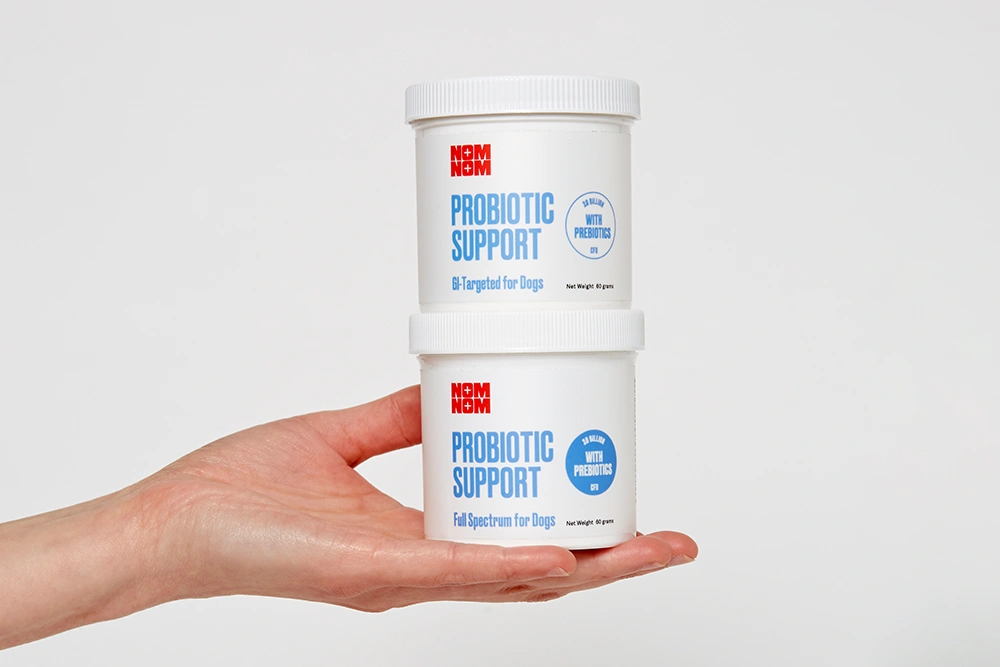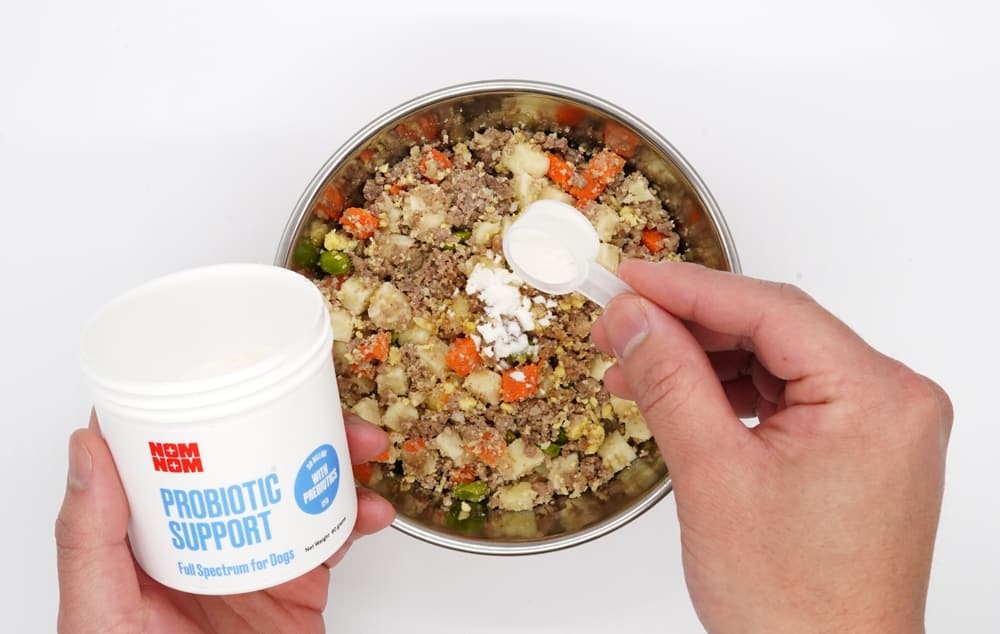Learn : Health & Wellness
Antibiotics, Probiotics & Their Effect on Pet's Gut Health
Whether your beloved pet suffers from a gastrointestinal (GI) disease or is just a bit more prone to an upset stomach, every parent wants to know the best course of action for digestive relief.
Dogs and cats, like humans, are prone to a variety of GI issues and diseases — all of which impact digestion and overall health. Common symptoms include diarrhea, vomiting, discomfort and inflammation.1
These issues can be acute instances or chronic conditions requiring continued attention and care, and are commonly associated with medications, food, pathogens, and disease.2 Different types of diarrhea and GI issues require different treatment, but antibiotics are a commonly prescribed remedy.
That said, probiotics are steadily making their way into the picture as well.3,4
Key takeaways from this article:
- Antibiotics kill both good and bad bacteria in the gut, probiotics provide healthy bacteria to the gut.
- Antibiotics can both treat and cause GI issues in dogs and cats.
- Antibiotics may improve or worsen the environment of the gut microbiome.
- Probiotics support a healthy gut microbiome and overall wellness.
- Probiotics can help support a variety of GI issues in pets and may be able to prevent or counteract the negative impacts of antibiotics on gut health.
What are antibiotics and probiotics?
Antibiotics, a modern medicine used to fight infections by killing pathogenic bacteria, are a common treatment prescribed for GI issues and diarrhea episodes in pets. But the relationship between antibiotics and the GI tract of our furry friends is a bit complicated — more on that later.
Probiotics, on the other hand, have an overall healthy relationship with the GI tract of pets. They are beneficial live bacteria and yeasts that promote a healthy gut microbiome by supporting friendly bacterial populations in the gut, all while preventing unhealthy ones from flourishing.5 When it comes to GI issues and probiotics in pets, research has found much success in treating a range of conditions.4
When considering the GI health of our pets, the use of antibiotics should be examined closely. Certain situations, like infections, certainly require antibiotics, and some GI conditions do respond well to them. However, in other instances antibiotics can actually lead to an upset stomach and negatively alter the gut microbiome.5 Plus, they’re not always more effective than some alternative treatment options.6
Probiotics may just be the missing element needed to help moderate the relationship between antibiotics and the gut.
When antibiotics help
Antibiotic-responsive diarrhea (like you might guess from the name) is a type of chronic diarrhea that responds well to antibiotics, resolving relatively quickly once prescribed. In these instances, other causes of diarrhea are ruled out, and the upset is speculated to be associated with bacterial overgrowth.2,7
This has been found to be especially common in large-breed dogs, and metronidazole and tylosin8 are two of the more common antibiotics prescribed for this condition.3,6 However, other broad-spectrum antibiotics have also shown efficacy.2 It’s also important to distinguish this for sudden, acute diarrhea which may not require antibiotics and in some cases is self-limiting as described below.
In cats, other chronic GI conditions have also seen success with antibiotic treatment.7,9 Similarly, metronidazole and tylosin are frequently the administered antibiotics, but in the case of long-term therapy tylosin may be the safer choice for our feline friends.9 In these conditions that respond well to antibiotic treatment, stopping use is frequently associated with relapse, thus antibiotics do not provide long-term relief.5
Antibiotics are also given as treatment in certain cases of acute diarrhea, when diarrhea is caused by harmful bacteria.3,10 Similarly, antibiotics may be given when there is risk of infection due to GI damage in very severe cases.3 In general though, acute cases of diarrhea will typically resolve themselves and do not require antibiotics, yet they are still often one of the first therapies vets turn to despite possible adverse impacts and the potential for antibiotic resistance to develop.2,6,11
When antibiotics hurt
Antibiotics are also associated with chronic GI issues because they can cause long-lasting dysbiosis.5,12 Dysbiosis is when the normal bacterial populations in the gut are altered, resulting in increased amounts of bad-bacteria (like E. coli) and decreased amounts of good-bacteria, resulting in an imbalance.4,5
This intestinal disparity results from antibiotic use because antibiotics don’t differentiate between the healthy and the harmful bacteria. The imbalance in the gut microbiome and elevation of pathogenic (disease causing) bacteria can cause GI distress, impair the immune system, and overall negatively impact the health of your pet.4,5,12
Gut dysbiosis left behind in the wake of antibiotic treatment can require months of recovery.5 We don’t know all the long-term consequences of antibiotic use in pets, but in humans we’ve seen it linked to the development of several diseases and conditions, such as inflammatory bowel disease (IBD) and obesity.13,14
Pets with chronic GI issues are commonly given certain antibiotics as a treatment. However, those same antibiotics are conversely known to lead to GI issues themselves.
- Both metronidazole and tylosin have been found to raise E. coli levels in dogs while simultaneously reducing good bacteria.5
- Metronidazole given for the treatment of acute diarrhea has been associated with long-lasting dysbiosis in dogs.5
- Amoxicillin use in dogs has been associated with the development of antibiotic resistance in E. coli, and in cats, amoxicillin has been shown to diminish bacterial populations.5
At times antibiotics are a necessary treatment for non-GI related infections. In these scenarios, chronic dysbiosis and acute GI issues (such as antibiotic-associated diarrhea) could result from the treatment of an unrelated condition.
So we’ve got ourselves a bit of a conundrum here. The same antibiotics that are used to treat one GI issue, can also lead to another GI issue. So what’s the solution?
Cue probiotics
Probiotics support a healthy gut microbiome which comes with associated benefits to wellness, including immune support, stress relief, protection from infections and disease and digestive and intestinal health.5,15 Each individual strain of probiotic bacteria has unique health-promoting properties,5 and researchers are still discovering the breadth of what probiotics can do for our pets.
Probiotics vs. antibiotics in the gut
In essence: Probiotics are actual live microorganisms, while antibiotics kill live microorganisms (even the good ones).
Given this conundrum, one probiotic of particular interest is Saccharomyces boulardii (S. boulardii), a strain of yeast, which has been found to remain untouched by antibiotics, which target bacteria. In humans S. boulardii has shown protection against antibiotic-associated diarrhea.16 And if you’re wondering, our probiotics specifically formulated to support the GI health of dogs do in fact contain S. boulardii.
In humans, probiotic use has seen promising results as a preventative measure and treatment for antibiotic-associated diarrhea,17 and at this point it’s relatively commonplace to recommend probiotics during antibiotic treatment.18
But what about for dogs and cats? The research there is much more limited, but emerging evidence for the simultaneous use of probiotics during antibiotics treatment appears promising.
Evidence in Dogs
Lincomycin is an antibiotic known to cause diarrhea in pets. In one study, dogs were given lincomycin until they experienced diarrhea.19 S. boulardii was also given to some of the dogs (some after they experienced diarrhea, and some from the beginning alongside antibiotics). Researchers found that in dogs that received S. boulardii from the start, none developed diarrhea. In those that received S. boulardii after they experienced diarrhea, it resolved faster than dogs who did not receive probiotic treatment at all.19
- Another study in dogs looked at the effect of probiotics on antibiotic-induced GI signs (vomiting & diarrhea) from treatment with enrofloxacin and metronidazole.20 The probiotics contained S. boulardii in combination with healthy probiotic bacteria and prebiotics (gut healthy fibers). This study found that the probiotics appeared to have a longstanding protective effect against antibiotic-induced GI signs, but more research is needed to understand their full impact.20
- In dogs with chronic GI issues, those treated with S. boulardii in addition to standard therapy (which included the antibiotic tylosin) showed greater improvement of symptoms than dogs just receiving standard therapy.21
- Take another study that examined shelter dogs experiencing diarrhea (a common problem). All were treated with the antibiotic metronidazole. Some of the dogs also received the probiotic Enterococcus faecium, and those dogs were found to have slightly better clinical outcomes.22
- In one last study, dogs with IBD either received therapy with metronidazole alone or in combination with a probiotic mixture. Probiotic therapy was found to reduce diarrhea and help improve the gut microbiome.23
Evidence in Cats
Several similar studies also have been performed for cats. In one, cats receiving the antibiotic clindamycin were divided into two groups: one received a combination of seven probiotic bacteria (plus two prebiotic fibers) while the other received a placebo.12 Antibiotic use negatively impacted the microbiome of all cats, and both groups experienced similar amounts of GI issues.
However, the microbiome profiles were still found to be significantly different between the cats on probiotics compared to placebo. This could indicate a protective effect of the probiotics on the microbiome, but more research is needed.12
- In another study with clindamycin, cats provided with a probiotic and prebiotic blend kept their appetites and experienced less vomiting.24
- In cats given amoxicillin, the probiotic strain Enterococcus faecium was found to have a significant impact on antibiotic-associated GI signs, with lower amounts of diarrhea experienced among cats that received the probiotic.25 However it should be noted that even in the presence of probiotics, the microbiome was still harmed by antibiotic use in all cats.25
So what does all this mean?
It is clear that the relationship between probiotics and antibiotics is complicated and more research is needed to understand their collective impact on our pet’s GI tract. But in both dogs and cats, current research indicates the ability of probiotics to protect the gut from the havoc brought on by antibiotics.
Of course, probiotics shouldn’t have to fight the good fight alone. Therapies should be multifaceted and include other actions that may help protect your pet’s gut from antibiotics, including a healthy diet.
A well-balanced highly digestible diet is thought to help reduce bacterial overgrowth in the gut, which may help keep your pet from requiring antibiotics in the first place.5,7 Adding fiber and prebiotics to the diet can help promote overall intestinal health, support healthy bacterial populations, eliminate toxins and encourage regularity.2,3,26 Emerging research is also showing a potential role for omega-3 fatty acids (like those found in fish oil) for GI and microbiome health in humans and animal studies,27 and scientists speculate they may have a role to play in the gut health of companion animals, too.28,29
All in all, probiotic use in pets is generally safe with minimal negative side effects.4 If you do decide to give your pet probiotics while they’re taking antibiotics, you might want to give them at least a few hours apart to help the healthy bacteria in the probiotics survive.4,20,24
What’s right for your pet may not be right for another pet; the treatment of GI issues in companion animals is personal. However, given the breadth of health-promoting effects of probiotics, and their ability to help resolve non-antibiotic related GI issues, adding them to your pets regime certainly doesn’t seem like a bad idea — especially if your pet commonly takes antibiotics.
References:
- Guilford, W. G. Nutritional management of gastrointestinal tract diseases of dogs and cats. J. Nutr. 124, 2663S–2669S (1994).
- Robert G. Sherding, S. E. J. Diseases of the Intestines. Saunders Manual of Small Animal Practice 702 (2006).
- Marks, S. L. Diarrhea. Canine and Feline Gastroenterology 99 (2013).
- Suchodolski, J. Probiotics, Prebiotics, Synbiotics, and Intestinal Health of Dogs and Cats. https://todaysveterinarypractice.com/probiotics-prebiotics-synbiotics-dogs-cats/ (2020).
- Ziese, A.-L. & Suchodolski, J. S. Impact of Changes in Gastrointestinal Microbiota in Canine and Feline Digestive Diseases. Vet. Clin. North Am. Small Anim. Pract. (2020) doi:10.1016/j.cvsm.2020.09.004.
- Antibiotics in canine GI disease: when to use and when to ditch. https://www.dvm360.com/view/antibiotics-in-canine-gi-disease-when-to-use-and-when-to-ditch.
- Hall, E. J. Antibiotic-responsive diarrhea in small animals. Vet. Clin. North Am. Small Anim. Pract. 41, 273–286 (2011).
- Westermarck, E. et al. Tylosin-responsive chronic diarrhea in dogs. J. Vet. Intern. Med. 19, 177–186 (2005).
- Twedt, D. C. Feline Colitis - WSAVA 2014 Congress - VIN. https://www.vin.com/apputil/content/defaultadv1.aspx?pId=12886&catId=57099&id=7054646&ind=128&objTypeID=17&print=1 (2014).
- Tysnes, K. R., Luyckx, K., Cantas, L. & Robertson, L. J. Treatment of feline giardiasis during an outbreak of diarrhoea in a cattery: potential effects on faecal Escherichia coli resistance patterns. J. Feline Med. Surg. 18, 679–682 (2016).
- German, A. J., Halladay, L. J. & Noble, P.-J. M. First-choice therapy for dogs presenting with diarrhoea in clinical practice. Vet. Rec. 167, 810–814 (2010).
- Whittemore, J. C., Stokes, J. E., Laia, N. L., Price, J. M. & Suchodolski, J. S. Short and long-term effects of a synbiotic on clinical signs, the fecal microbiome, and metabolomic profiles in healthy research cats receiving clindamycin: a randomized, controlled trial. PeerJ 6, e5130 (2018).
- Kronman, M. P., Zaoutis, T. E., Haynes, K., Feng, R. & Coffin, S. E. Antibiotic exposure and IBD development among children: a population-based cohort study. Pediatrics 130, e794–803 (2012).
- Francino, M. P. Antibiotics and the Human Gut Microbiome: Dysbioses and Accumulation of Resistances. Front. Microbiol. 6, 1543 (2015).
- Grześkowiak, Ł., Endo, A., Beasley, S. & Salminen, S. Microbiota and probiotics in canine and feline welfare. Anaerobe 34, 14–23 (2015).
- Can, M., Beşirbellioglu, B. A., Avci, I. Y., Beker, C. M. & Pahsa, A. Prophylactic Saccharomyces boulardii in the prevention of antibiotic-associated diarrhea: a prospective study. Med. Sci. Monit. 12, PI19–22 (2006).
- Hempel, S. et al. Probiotics for the prevention and treatment of antibiotic-associated diarrhea: a systematic review and meta-analysis. JAMA 307, 1959–1969 (2012).
- McFarland, L. V. Antibiotic-associated diarrhea: epidemiology, trends and treatment. Future Microbiol. 3, 563–578 (2008).
- Aktas, M. S., Borku, M. K. & Ozkanlar, Y. Efficacy of Saccharomyces boulardii as a Probiotic in Dogs with Lincomycin Induced Diarrhea. Bull. Vet. Inst. Pulawy 51, 365–369 (2007).
- Whittemore, J. C., Moyers, T. D. & Price, J. M. Randomized, controlled, crossover trial of prevention of antibiotic-induced gastrointestinal signs using a synbiotic mixture in healthy research dogs. J. Vet. Intern. Med. 33, 1619–1626 (2019).
- D’Angelo, S. et al. Effect of Saccharomyces boulardii in dog with chronic enteropathies: double-blinded, placebo-controlled study. Vet. Rec. 182, 258 (2018).
- Fenimore, A., Martin, L. & Lappin, M. R. Evaluation of Metronidazole With and Without Enterococcus Faecium SF68 in Shelter Dogs With Diarrhea. Top. Companion Anim. Med. 32, 100–103 (2017).
- Rossi, G. et al. Comparison of microbiological, histological, and immunomodulatory parameters in response to treatment with either combination therapy with prednisone and metronidazole or probiotic VSL#3 strains in dogs with idiopathic inflammatory bowel disease. PLoS One 9, e94699 (2014).
- Stokes, J. E., Price, J. M. & Whittemore, J. C. Randomized, Controlled, Crossover trial of Prevention of Clindamycin-Induced Gastrointestinal Signs Using a Synbiotic in Healthy Research Cats. J. Vet. Intern. Med. 31, 1406–1413 (2017).
- Torres-Henderson, C., Summers, S., Suchodolski, J. & Lappin, M. R. Effect of Enterococcus Faecium Strain SF68 on Gastrointestinal Signs and Fecal Microbiome in Cats Administered Amoxicillin-Clavulanate. Top. Companion Anim. Med. 32, 104–108 (2017).
- Leib, M. S. Treatment of Chronic Idiopathic Large-Bowel Diarrhea in Dogs with a Highly Digestible Diet and Soluble Fiber: A Retrospective Review of 37 Cases. J. Vet. Intern. Med. 14, 27–32 (2000).
- Costantini, L., Molinari, R., Farinon, B. & Merendino, N. Impact of Omega-3 Fatty Acids on the Gut Microbiota. Int. J. Mol. Sci. 18, (2017).
- Bauer, J. E. Therapeutic use of fish oils in companion animals. J. Am. Vet. Med. Assoc. 239, 1441–1451 (2011).
- Ontsouka, C. E., Burgener, I. A., Mani, O. & Albrecht, C. Polyunsaturated fatty acid-enriched diets used for the treatment of canine chronic enteropathies decrease the abundance of selected genes of cholesterol homeostasis. Domest. Anim. Endocrinol. 38, 32–37 (2010).



 Putting the Pro in Probiotic Supplements for Dogs
Putting the Pro in Probiotic Supplements for Dogs
 Allergies & Probiotics
Allergies & Probiotics
 Gastrointestinal Disease & Probiotics
Gastrointestinal Disease & Probiotics